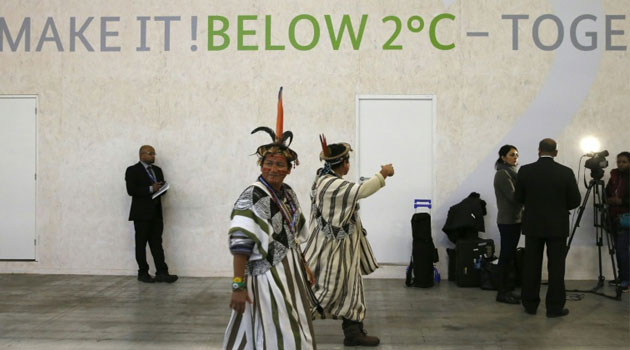
Lyndon Pishagua Chinchuga, a representative of the indigenous peoples of the Peruvian Amazon, walks past a stand at COP 21, the United Nations conference on climate change, at Le Bourget on December 3, 2015 More than 150 world leaders are meeting under heightened security, for the 21st Session of the Conference of the Parties to the United Nations Framework Convention on Climate Change COP21/CMP11) from November 30 to December 11.
© AFP
LE BOURGET, France, Dec 4 – Angry developing nations warned Thursday that increasingly tense UN talks aimed at averting catastrophic climate change would fail unless a bitter feud over hundreds of billions of dollars was resolved.
Negotiators from 195 nations are haggling in Paris over a planned universal accord to slash greenhouse-gas emissions that trap the Sun’s heat, warming Earth’s surface and oceans and disrupting its delicate climate system.
Taking effect from 2020, the pact would target emissions from fossil fuels such as coal, oil and gas — the backbone of the world’s energy supply today — as well as from the cutting down of rainforests.
The question of finance to help developing countries make the shift to cleaner energy sources is “make or break”, said South African negotiator Nozipho Mxakato-Diseko, who spoke on behalf of the G77 group of 134 developing and emerging countries, plus China.
“It has to be clearly understood that finance is critical,” she told a news conference.
At stake is hundreds of billions of dollars that would need to start flowing from rich to developing nations from 2020. However the developed nations have yet to fully commit to the financing deal.
With frustrations at the conference mounting, UN Secretary-General Ban Ki-moon called on the world’s leading economies to honour the financing pledge they made at the last major climate summit six years ago.
“I have been urging the developed world leaders that this must be delivered,” Ban told reporters at UN headquarters in New York. “This is one very important promise.”
Of the $100 billion to be mobilised by 2020, $62 billion has been raised so far, he added.
More than 150 world leaders including President Barack Obama launched the talks Monday, seeking to build momentum for the tough negotiations ahead with lofty rhetoric about the urgency of the task.
But after three days of grinding discussions over a hugely complex 54-page draft pact, bureaucrats unveiled a document just four pages shorter and with vast stretches of text yet to be agreed.
– Frayed tempers –
By the end of a day of frustratingly slow negotiations, tempers frayed.
“I am deeply concerned. I’m out of words. I have been doing this for many years, and this is just not right,” Bolivia’s Juan Hoffmaister, representing the G77 and China, told fellow negotiators at an evening session.
At the heart of the dispute is a demand by developing nations that the rich shoulder the most responsibility for fighting global warming because they have emitted most of the greenhouse gases since the start of the Industrial Revolution.
But some rich nations point out that developing nations, particularly China and India, are now big polluters.
Norwegian negotiator Aslak Brun said they were grappling with “very hard lines on all sides”.
“Pointing fingers at this point in time saying: ‘you are to blame and we are the good guys’, it doesn’t help us. Collectively, we just have to really speed up,” he said.
Ministers from around the globe will descend on Paris Monday to try to transform the draft prepared by diplomats into a universal accord to avert planetary overheating. The conference is scheduled to end on December 11.
– ‘Unthinkable failure’ –
French Environment Minister Segolene Royal said she was still confident warring sides would come together by December 11.
“It is normal for it to take a day or two for negotiations to get into gear,” she told AFP.
“It is unthinkable to imagine failure.”
At the core of the talks is the goal of limiting average warming to a maximum of two degrees Celsius (3.6 degrees Fahrenheit) over pre-Industrial Revolution levels.
Scientists warn time for action is running out, issuing ever-louder warnings that steadily growing carbon emissions will doom future generations to rising seas and worsening floods, storms and drought — a recipe for hunger, disease and homelessness for many millions.
James Hansen, one of the world’s foremost climate scientists, warned in an interview with AFP that even capping warming to 2 C was a massive risk.
“Two degrees Celsius warming above pre-Industrial would put us at least at the temperature of the last inter-glacial period. Sea level was six to nine metres (20-30 feet) higher then,” he said.
“If we let ice sheets become unstable, the world may become ungovernable because the economic consequence would be so great.”









































